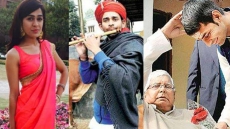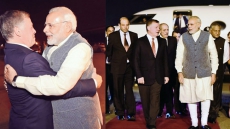The cases pertaining to 1984 anti-Sikh riots, looting and arson at New Delhi's Trilokpuri indicate the way law and order machinery had broken down, the Delhi High Court said Wednesday and suggested reforms in criminal law to deal with such matters.
Justice RK Gauba said the civil administration did not take timely or effective action to prevent the riotous conditions from spiraling out of hand, the criminal law process was slow and delayed and it all led to such matters continuing to linger in courts.
The high court said that this showed that "the response of the law has been tardy, ineffective and highly unsatisfactory".
"The case at hand, as observed elsewhere in this judgment, may be treated as a paradigm which ought not be followed in cases of such nature. The law and order machinery had broken down. The police forces, and the civil administration, did not take timely or effective action to prevent the riotous conditions from spiraling out of hand," it said.
"The criminal law process began, but hesitatingly and belatedly. The fact that these cases have continued to linger in the courts at the stage of trial or appeals or revisions till date itself is an indicator of the reality that the response of the law has been tardy, ineffective and highly unsatisfactory," the court said.
The observations by the high court came while dismissing the 22-year-old appeals of 70 out of 88 persons convicted and awarded five-year jail term for rioting, looting and burning houses in Trilokpuri area during the 1984 anti-Sikh riots.
Of the remaining 19 people, 16 died during the pendency of their appeals against the trial court's August 27, 1996 decision.
The appeals of the three others were dismissed after they absconded, the high court noted in its judgement.
The court also said that general criminal law was "provenly ill-equipped" to deal with the challenge of such crimes of mammoth proportion, "particularly when they invariably are perceived to be engineered by those holding control over certain power centres".
It further said that no meaningful thought has been spared till date to usher in reforms in the judicial process to effectively deal with the cases of communal riots "which are engineered, more often than not, by those who have clout or influence- of various kind".
The court said it needs to be noted again that after each event of communal riots, allegations of political influences having worked as the root cause or for protection of those responsible have surfaced.
"There perhaps can be no two opinions about the fact that a sense of neutrality in the investigative and prosecution process has to be injected. And, towards this end, the possibility of entrusting such tasks to authorities other than normal agencies of the State needs to be explored," the court suggested.
The court suggested amending the Commissions of Inquiry Act, 1952 and the Protection of Human Rights Act, 1993 to entrust such bodies with the responsibility of taking note of cognisable offences committed in communal riots, investigate through special investigating teams (SITs) under their control and oversee prosecution through Special Public Prosecutor(s) engaged by them.
"The law on the subject of communal riots cannot be a complete answer to the challenge unless it also establishes special courts with suitable amendments to the general criminal law procedure as indeed the rules of evidence," the high court suggested.
It also said that since media -- both print and electronic -- were the fourth pillar of democracy, press reports supported by photographic material and video footage may be utilised as evidence in trials of criminal cases arising out of communal riots.


